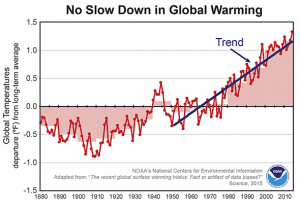In anticipation of president-elect Donald Trump’s inauguration in January, scientists are working round the clock to safeguard federal government climate change data. Many academics and librarians share the concern that Federal dot-gov climate data and information, for example from the EPA and NOAA websites, will be lost or become unavailable with the transition to the new administration. Fact is, a large percentage of information on federal government servers, including digital federal records, reports, and research, is not protected by any law or agency mandate, and can vanish within days of the arrival of a new president.
Because the loss of this data would be particularly damaging to climate change research (identifying long term trends through years-long data compilation is crucial to scientific climate change analysis), environmental researchers, assisted by librarians, are saving federal government climate data to non-government servers. These concerned researchers are turning to the End of Term Presidential Harvest 2016, a project that began before the 2008 elections, staffed by volunteers at university, government and nonprofit libraries, to preserve valuable and vulnerable information on federal government web servers.
Other efforts to copy and maintain this irreplaceable public data includes a “guerrilla archiving” event in Toronto that focused on cataloging key federal environmental data, and Climate Mirror, a site created by scientists and database experts to house public data scientific information harvested from federal dot-gov sites. Climate Mirror is self-described as “part of an ad-hoc project to mirror public climate datasets before the Trump Administration takes office to make sure these datasets remain freely and broadly accessible.”
Legal and environmental studies researchers can contribute to this effort to save climate change data. Because there isn’t time to archive all the information, nominations from the public identifying pages for preservation are requested. While doing research, you may have come across studies or datasets from the federal dot-gov world that should be preserved.
Please take the time to identify such data using this nominating tool.
Sources and Further reading:
Jim Dwyer, Harvesting Government History, One Web Page at a Time, N.Y. Times, December 1, 2016.
Toronto ‘guerrilla’ archivists to help preserve US climate data, December 15, 2016, BBC.
